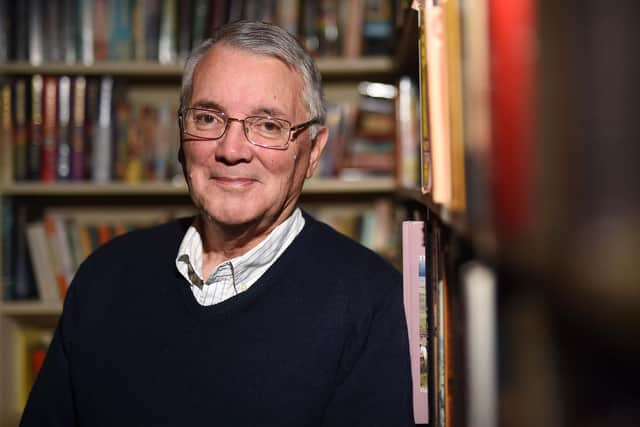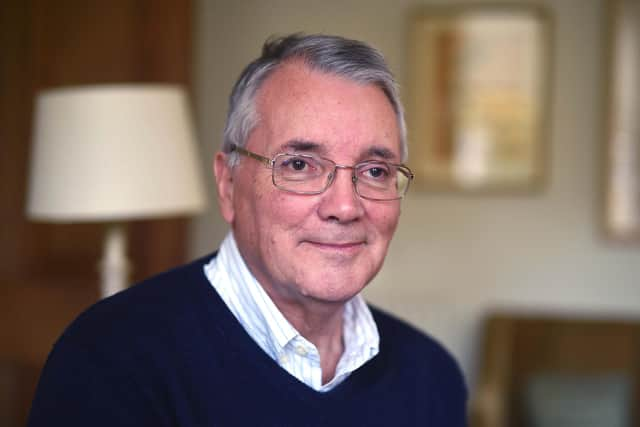The Big Interview: Temple Melville, chief executive of The Scotcoin Project CIC
The Scotland-based businessman is a strong advocate both of the blockchain and decentralised currencies, and has been involved with Scotcoin since 2014, “helping to reposition it as an ethical [cryptocurrency] with a strong social and charity agenda” – and with its initial exchange offering set for the early part of 2022.
Mr Melville is billed as one of a handful of people in the UK certified as continuing professional development instructors for blockchain and the first in Scotland, and he gives talks to students, academics and industry professionals across the globe.
Advertisement
Hide AdAdvertisement
Hide AdAdditionally, his book Blockchain, Bitcoin and YOU is described as “a treasure trove of information for anyone with a curiosity about this new technology” by Fintech Scotland’s Stephen Ingledew.


Mr Melville – who was named after the village of Temple outside Edinburgh – attended the London School of Economics in the same era as Mick Jagger, adding accounting and marketing qualifications in later life, and a veteran of management consultancy.
Scotcoin describes itself as “Scotland’s first and only digital currency”. Can you give more details about what Scotcoin is and what its appeal is over other cryptocurrencies?
Scotcoin is a digital currency in the same way as Bitcoin or Ethereum. There are now more than 14,000 cryptocurrencies, so we have to have a use-case that appeals. That is why we have such a firm commitment to the charity sector and the desire to make all the people of Scotland better off. The use of Scotcoin within Scotland will, in my view, change the financial landscape for the better.
Regarding its clear mission to do good, why is that such a key priority, and how do you aim to achieve that?


It is critically important that we all do our utmost to help the disadvantaged, but equally in the wider world it is incumbent on us to “go green” and take the sustainable and circular-use paths. From the very start, we have concentrated on taking out waste and adding value.
A good example is a recent initiative we undertook where a manufacturer had tracksuits they were going to burn. We bought them for Scotcoin and were able to give them to [homelessness-focused charity] Emmaus in Glasgow. It was a win-win situation – the manufacturer didn’t have the cost of incineration and got value in Scotcoin, which they could use for their own added-value offerings or subsequently sell.
There are lots of things like this we could do and will do. We firmly believe that a generally available digital currency within a country such as Scotland is a major step forward in the digital world, offering huge possibilities. With more than 7,000 holders of Scotcoin, we already have a good basis for expansion.
Advertisement
Hide AdAdvertisement
Hide AdScotcoin is already being used in the Arlington Bar in Glasgow, the Scottish Design Exchange and has teamed up with social enterprise Greater Good Glass, while also eyeing property acquisition, for example. What is your outlook for more tie-ups, and how can Scotcoin help Scottish businesses?
There are lots of initiatives we are involved with, but I will mention just two. Firstly, we are the designated native token of Better Internet Search. They do away with all those annoying ads and emails after you have looked for something.
Secondly, we have a tie up with people called BBXuk.com. They have almost 500,000 members worldwide, and holders of Scotcoin will be able to buy their goods and services direct. As an example, it is possible for businesses to buy legal and accounting services, as well as marketing, accommodation, travel, mailing lists and lots of other things that could be useful to small and medium-sized enterprises. Even photocopiers!
What other esoteric things can you do with Scotcoin? You could buy a book from Leamington Press and watch as your roof is fixed by Asap Roofing, and have a film made of it too with Bad Pony Productions – all Scottish-based companies. I really like some of the weird combinations that might be possible!
You personally were an early adopter of crypto – how did you become interested in it, and convinced by its potential?
For my sins, amongst other things, I studied mathematics at university, and became very interested in cryptography [the study of secure communications techniques]. As an aside, one of the last things I learned there was about something called “sets.” These are the basis of computing. I was horrified to learn my nine-year-old grandson is already doing them!
As a further aside, the university was mostly shut whilst I was there, with student riots and demonstrations. I’ve always said they only gave me a degree because they never saw me in any of the riots!
I had also been marginally involved with Linux, which is a steppingstone to the blockchain as we know it. What the Linux developers did was create a system where ALL nodes or computers on the system received identical information at the identical time. As a result, all the developers knew exactly the point that had been reached.
Advertisement
Hide AdAdvertisement
Hide Ad[Mysterious Bitcoin inventor] Satoshi Nakamoto’s genius was to create conditions such that the double spend problem was solved. In essence you want anything digital – eg a book or downloaded music – to be identical. You don’t want the ending of a book to change every time you read it!
But you do NOT want money to be identical and endlessly repeatable. Each unit of value therefore has to be discrete and individual, so it was pushing at an open door for me when the present revolution began.
And do remember – from zero in 2009, we are now at around £2.5 TRILLION in value for crypto currencies. It was clear almost immediately that there were lots of uses of the blockchain. Remember, Bitcoin and crypto is only ONE use of the blockchain – there are many, many more.
Could you summarise your career pre-Scotcoin?
I began my business life in the Glasgow Wholesale Fruit Market and had many happy years there. During that time, I started to invest in property and eventually reversed my holdings into a publicly listed company where I was joint managing director.
I sold out after a few years and spent time working on various charity projects and owned a book-publishing company. But I returned to property, which I enjoyed very much, for quite a number of years.
My first Bitcoin was acquired for around $200 (£151) and needless to say sold years ago! Everyone has a Bitcoin story, and mine is no different. Scotcoin began in 2013, and I think I bought my first SCOT [Scotcoin] at the end of that year. The original creator lost interest and in late 2015/early 2016 the present management bought out the intellectual property and whatever coins were available.
At that point we were on what is called the Counterparty Protocol, which sits on the Bitcoin blockchain. It became very clear that this protocol was not fit for purpose, so a lot of money and time was spent to create and promote the present system, as well as migrate previous holders to the new token.
Do you see Scotcoin as continuing Scotland’s pioneering history in financial services – or rather as a rebellion against the mainstream?
Advertisement
Hide AdAdvertisement
Hide AdWe are very much in the pioneering mode. There are so many things that digital currencies can do that fiat currencies (pounds, dollars, euros) simply cannot. I have always believed that digital and fiat are complementary, so it’s an added benefit rather than an enemy.
Look at WIR in Switzerland. Technically a cryptocurrency (though not digital) that was founded in the 1930s, it has grown alongside the Swiss Franc and now more than 70,000 businesses use it, with some 15 per cent of Swiss inhabitants holding some. Additionally, the turnover in WIR is more than $7 billion annually.
If we can emulate that, it would have a profound effect on Scotland and its economy.
What is your ultimate aim for Scotcoin – when do you see it becoming mainstream? And to what extent will Scotland’s constitutional future dictate its outlook?
As I’ve said we want all the people of Scotland to be better off, and by working with a wide network of charities we have every hope that this will happen.
In terms of mainstream usage, this will depend on adoption, but already we are finding people like the idea of free transfers of value and retailers love the idea that they don’t have to pay to take money on card machines – or even the fees they pay to deposit or withdraw actual cash from banks.
As regards constitutional change and the future, I can only repeat, our object is for everyone to be better off in all respects – using less energy, recycling more, and helping to deliver shelter and clothes and enough to eat.
There is no reason we can’t do this in a proud and passionate country like Scotland. One of the things I like most about Scotcoin is its moniker. The pound’s moniker is GBP, the dollar USD, the Euro, EUR. And Scotcoin? We are SCOT. And I don’t think you can get any better than that.
A message from the Editor:
Thank you for reading this article. We're more reliant on your support than ever as the shift in consumer habits brought about by coronavirus impacts our advertisers.
If you haven't already, please consider supporting our trusted, fact-checked journalism by taking out a digital subscription.
Comments
Want to join the conversation? Please or to comment on this article.
